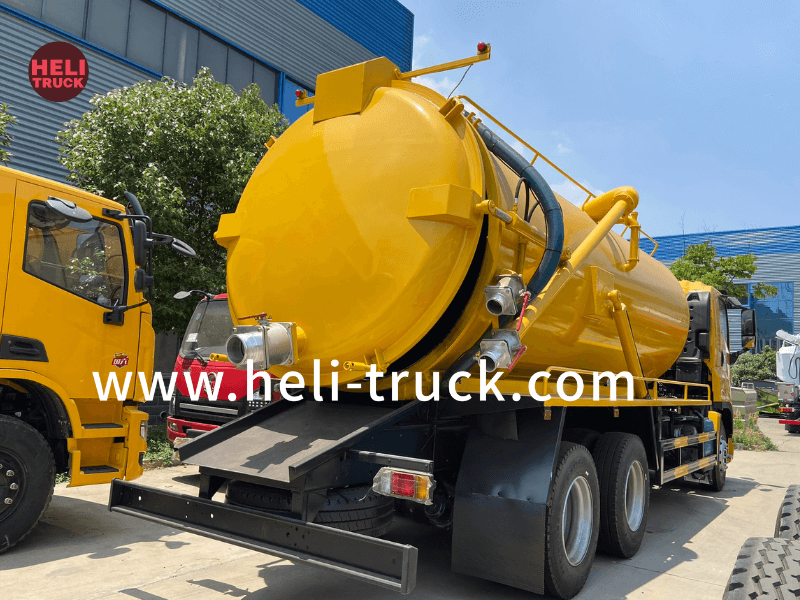Introduction:
Waste management is a critical aspect of maintaining environmental sustainability and public health. As urbanization and industrialization continue to rise, the need for efficient waste treatment methods becomes increasingly imperative. One such method that has gained significant attention and revolutionized the waste management industry is vacuum truck waste treatment. Vacuum trucks, equipped with powerful suction systems, have become indispensable in the collection and transportation of various waste materials, providing an effective solution for waste management challenges. This article explores the process, benefits, and future prospects of vacuum truck waste treatment in detail.
Section 1: Understanding Vacuum Truck Waste Treatment
1.1 What is a Vacuum Truck?
A vacuum truck, also known as a sucker truck or suction excavator, is a specialized vehicle designed with a powerful vacuum system that enables the collection and transportation of different types of waste materials. These trucks are equipped with a large tank, a vacuum pump, and a filtration system to efficiently remove and store waste.
1.2 Types of Waste Handled by Vacuum Trucks
Vacuum trucks are versatile machines capable of handling various types of waste, including:
a) Liquid Waste: Vacuum trucks can efficiently collect and transport liquids such as sewage, wastewater, industrial effluents, and hazardous materials.
b) Solid Waste: These trucks can also handle solid waste materials, including sludge, mud, sand, and debris.
c) Dry Waste: Some vacuum trucks are equipped with additional features such as blowers to handle dry waste materials like powders, grains, and granules.
1.3 Vacuum Truck Waste Collection Process
The waste collection process using vacuum trucks typically involves the following steps:

a) Vacuum Generation: The vacuum truck's powerful pump creates a vacuum by removing air from the tank, creating suction that enables waste collection.
b) Waste Extraction: The suction hose is inserted into the waste source, and the vacuum system extracts the waste material into the tank.
c) Filtration and Separation: The collected waste undergoes filtration and separation processes within the truck to remove solid particles, debris, and other impurities.
d) Waste Storage and Transportation: Once the waste is filtered and separated, it is stored in the truck's tank for transportation to the designated waste treatment facility.
Section 2: Benefits of Vacuum Truck Waste Treatment
2.1 Environmental Benefits
a) Efficient Waste Removal: Vacuum trucks enable the swift and efficient removal of waste, minimizing the risk of contamination and environmental damage.
b) Pollution Prevention: Vacuum truck waste treatment reduces the risk of spillage, leakage, and improper disposal, thereby preventing pollution of water bodies, soil, and air.
c) Odor Control: The vacuum system ensures airtight waste storage, reducing unpleasant odors commonly associated with waste transportation.
2.2 Health and Safety Benefits
a) Disease Prevention: Proper waste collection and treatment through vacuum trucks significantly reduce the risk of waterborne and airborne diseases by minimizing exposure to waste materials.
b) Hazardous Material Handling: Vacuum trucks equipped with specialized compartments can safely handle and transport hazardous materials, minimizing the risk to workers and the environment.
c) Worker Safety: Vacuum truck waste treatment eliminates the need for manual handling of waste, reducing the risk of injuries and accidents for workers involved in waste management.
2.3 Economic Benefits
a) Cost-Efficiency: Vacuum truck waste treatment offers cost savings by reducing the need for multiple collection vehicles, manual labor, and traditional waste disposal methods.
b) Time-Saving: The efficient waste collection and transportation capabilities of vacuum trucks save time and resources for waste management companies and municipalities.
Section 3: Applications and Future Prospects
3.1 Municipal Waste Management
Vacuum trucks play a crucial role in municipal waste management, helping in the collection and transportation of sewage, wastewater, and other waste materials from residential areas, public spaces, and commercial establishments.
3.2 Industrial Waste Management
Industries generate large volumes of waste, including hazardous substances that require specialized handling. Vacuum trucks equipped with the necessary compartments and filtration systems are utilized to safely collect, transport, and dispose of industrial waste.
3.3 Emergency Response and Disaster Management
During emergencies and natural disasters, vacuum trucks are deployed to assist in the cleanup and removal of hazardous materials, ensuring the restoration of affected areas and minimizing environmental damage.
3.4 Future Prospects
a) Technological Advancements: Continuous advancements in vacuum truck technology, including improved suction power, filtration systems, and waste separation techniques, will enhance the efficiency and effectiveness of waste treatment processes.
b) Sustainable Energy Solutions: Researchers are exploring the possibility of utilizing waste collected by vacuum trucks for energy generation through methods like anaerobic digestion or biofuel production.
https://www.heli-truck.com/fuel-tank-truck/ ) Integration with Smart Waste Management Systems: Vacuum trucks can be integrated into smart waste management systems, enabling real-time monitoring, route optimization, and automated waste collection, further enhancing efficiency and reducing environmental impact.
Conclusion:
Vacuum truck waste treatment has revolutionized waste management practices, offering efficient, cost-effective, and environmentally-friendly solutions. The ability to handle various waste types, coupled with the numerous benefits it provides, positions vacuum truck waste treatment as a key component in achieving sustainable waste management. As technology continues to evolve and new applications emerge, vacuum trucks will play an increasingly critical role in shaping the waste management industry, enabling a cleaner and greener future for generations to come.
